Oct 2, 2017
Food, environment and human health, local economy and resilient communities
By Elena Karoulina
Executive Director of Sustainable Solano
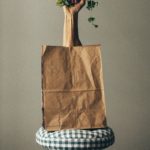
Image from Pixabay
When was the last time you had Solano-grown produce on your dinner table? The most possible answer is ‘never’, unless you grow your own food in your garden or your backyard food forest. It’s a very unusual situation for a Bay Area county that is still largely agrarian, at least in the land use patterns.
Sustainable Solano is embarking on a new project to bring more local food to our communities and to connect our local farmers, chefs, and residents with the gifts of our land and with each other.
At the very end of September we received great news from the United States Department of Agriculture (USDA): our proposal to further our vision by developing a business plan for Solano Community Food Centers was selected for funding! Annually, USDA funds about 14% of grant applications for local food projects, and we are honored to earn support on a federal level.
What is a Community Food Center? It is a hub for local food activities: CSAs deliveries, cooking classes, community education, and large kitchens where chefs and community members can cook wholesome nutritious meals. Larger Community Food Centers can include a food co-op.
Although Solano County produces close to $354 million worth of agricultural products and exports these products to more than 40 countries, only a fraction of that amount remains in the county due to weak distribution system, lack of sales outlets and somewhat low interest in local food. You can hardly find any Solano-grown products in our farmer markets, stores and restaurants. Small farmers struggle to hold on to their land and to connect with local customers.
Where do we buy local food? People who can afford it obtain their local ag products in the markets outside our county: Napa, Sonoma, Berkeley (thus spending local money outside our local communities). Some cities in Solano are blessed with Community Supported Agriculture, but not many people know about this option and take advantage of it. People with low means have to go without local fresh food at all. Solano is a county of commuters, and unfortunately, the only option available for families on a go is fast-food restaurants and convenience stores (you cannot find local food there!).
We pay dearly for this lack of access to local food with our health: Solano County is among the sickest counties in the nation. Obesity, diabetes, heart disease rates are above national average in our home county.
Food, human health, the environment and local economies are all interconnected; by creating a network of city-based Community Food Centers, there is potential to re-envision and re-construct Solano County’s food system so that it works for everyone in the local food supply chain.
Sustainable Solano has partnered with researchers at UC Davis, Solano County Department of Agriculture and Department of Public Health to conduct a feasibility study, develop an effective business plan, and outline implementation for local food businesses that aggregate, process and distribute locally-produced, healthy food products. Our big vision is the environmentally and economically sustainable, equitable local food systems in Solano County.
We are looking for urban and rural farmers, chefs and local food activists interested to implement this vision. We’d love to hear from you with your comments, suggestions, reflections, and offers to help. Please email directly to me at elena@sustainablesolano.org
Let’s make it happen! I am looking forward to meet all of you at the official launch of the program on Wednesday, October 25, at 7 pm, at Benicia’s Heritage Presbyterian Church (doors open at 6 pm). Please join our Advisory Board members Dr. Feenstra and Dr. Campbell in the conversation about the future of food and why local resilient food system is so important. Come meet the project team and all of us interested to bring this vision to reality.
Sep 5, 2017
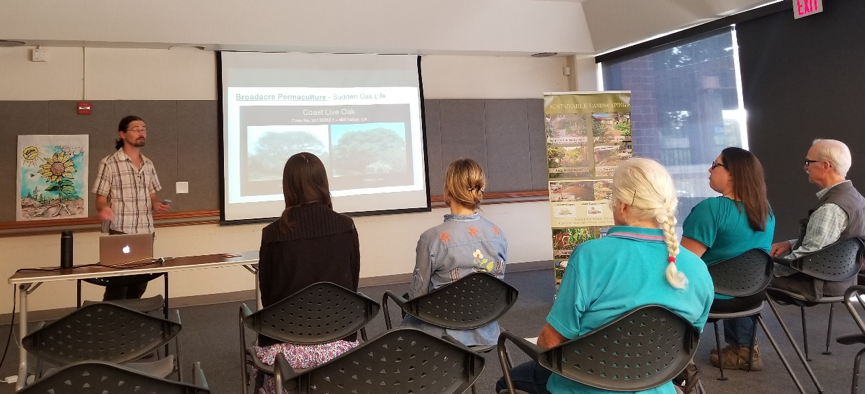
Sustainable Solano recently expanded its Sustainable Backyard Program to the City of Fairfield by launching a series of public education classes and workshops on the topics of sustainability, community resilience and sustainable landscaping. On August 26th, Fairfield residents attended the first of these events at an inspiring and thought-provoking talk with educator, ecological designer, farmer and musician, David Shaw at Fairfield Civic Center Library. Attendees listened as he beautifully defined and illustrated natural landscape, social and economic permaculture principles that contribute to a more harmonious, sustainable world.
Permaculture design principles are most commonly applied to agricultural ecosystems and are intended to be sustainable and self-sufficient. David covered the various supporting layers of a standard food forest garden and explained how they work together, effortlessly to produce edible, life-supporting ecosystems using simple regenerative design methods used for thousands of years by generations who lived in harmony with our Earth. However, he explained that permaculture principles can be applied to not only landscapes, but also to local social structures, communities and within our own economic markets.
Beautiful photos of various Oregon neighborhoods that have transformed local intersections and streets through community block repair projects showed how urban revival can help close social boundaries and strengthen communities bring residents together through healthy social exchange. Colorful intersection street art, corner “take a book, leave a book” libraries and community garden share plots were a real source of inspiration for attendees to see!
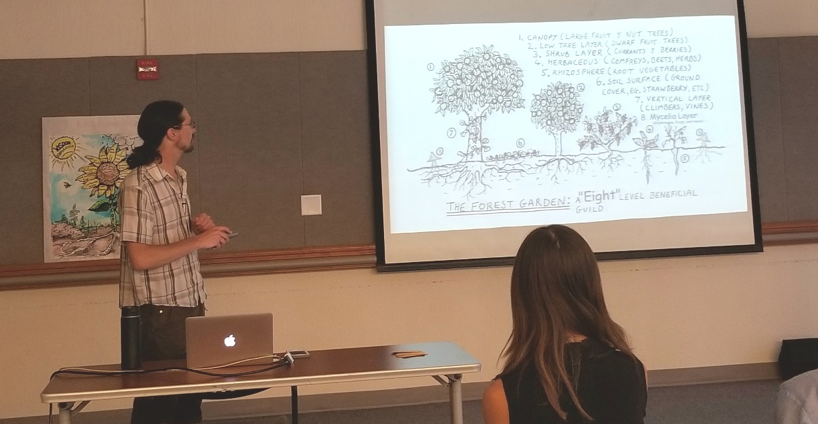
David also stirred up some curious fascination in the room when introducing the concept of financial permaculture. A local new economy manifesto called Bay Bucks whose mission is to create a functioning regional currency that helps local businesses thrive while promoting collaboration and building community wealth has already made its mark in our very own Bay Area. This new economy approach distributes power democratically to its community of users, keeping wealth circulating locally, and reversing the features that create wealth disparity. You can find out more about Bay Bucks by clicking here. (Link: http://www.baybucks.com/)
David works to help build connections with ourselves, each other, and with nature focusing on global sustainability, resiliency, permaculture and sustainable backyards. Attendees left with great tools and ideas and how they can begin applying permaculture principles in their own gardens and neighborhoods.
David Shaw, is a Permaculture and whole systems designer, facilitator, and educator. He founded Santa Cruz Permaculture and the UC Santa Cruz Common Ground Center, two inter-generational partnerships focused on collective action for justice and sustainability. Additionally, he is the coordinator of the Right Livelihood College, and serves on the World Cafe Community Stewardship Council. In order to meet the challenges of today, he is creating an urban farm and inter-generational learning center that fosters hands-on farm and wilderness skills, social entrepreneurship, conversational leadership, and collective action. He lives happily and humbly on a 2-acre homestead in Santa Cruz.
For more information on David Shaw, please visit:
santacruzpermaculture.com
kresge.ucsc.edu/commonground
rightlivelihood.org
theworldcafe.com
Sep 5, 2017

Greg Morrison, Paula Schnese, Ana Acosta and Wolf Hagar travel to Sacramento to file CCFC’s articles of incorporation with our Secretary of State.
Big news! Cultivate Community Food Cooperative, Inc. celebrates becoming an official business entity in the State of California! Cultivate Community Food Co-op (CCFC) is working to establish Solano County’s first community-owned, natural grocery store- a one-stop, brick and mortar grocer dedicated to providing high quality, locally sourced, culturally relevant, ethically produced and affordable products for a more sustainable local economy.
This summer, four members of CCFC’s steering team including Founder Paula Schnese, Wolf Hagar, Ana Acosta, and Greg Morrison traveled to the office of the Secretary of State in Sacramento to file Cultivate Community Food Cooperative, Inc.’s Articles of Incorporation, mandatory in the state to enable a cooperative to operate as a legal entity.
Everyone is invited to attend the “Incorporation Celebration” event on Friday, September 8th from 7:00p-9:00p in the back room of the Rellik Tavern on First St. in Benicia to share in a toast of champagne (or a cup of tea) to celebrate this huge community milestone. Bring your wallets as this will be the first opportunity to buy in on Owner Shares! Be one of the first 100 owners and you will receive a special ‘Thank You’ gift from CCFC!

Sep 2, 2017
By Tina Saravia, U.C. Master Gardener, Solano County
It all started for me in September 2014, when I attended a talk on Permaculture in Benicia with another Master Gardener friend. I have heard of Permaculture for years, but it always seemed like a foreign concept to me. I did not know anyone, in my broad circle of urban horticulturally-inclined individuals, who practiced Permaculture. The fact that it was in Benicia, a 20- minute drive from my house, made it more real.

Permaculture Talk with Toby Hememway
What is Permaculture? Permaculture is a word originally coined by Bill Mollison and David Holmgren in the mid 1970’s to describe an “integrated, evolving system of perennial or self-perpetuating plant and animal species useful to man” (Holgrem Design. https:// www.holmgren.com.au/about-permaculture/). Permaculture is a design system based on ecological principles. The word originally referred to “permanent agriculture.” It has more recently expanded to stand for “permanent culture.”
Permaculture can be defined and explained in many ways. It encompasses many aspects. In its simplest form, it is a design system that can be adapted anywhere in the world, in any setting — urban, suburban or rural, no matter the size of the property. One of those design aspects that is easily adaptable is Food Forest Gardening, which is what the local grassroots organization, Sustainable Solano, started in Benicia.
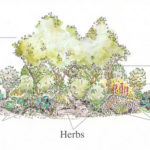 They help homeowners create their own sustainable food forest. The gardens feature edible plants in varying heights and sizes, mimicking a forest. The gardens use a combination of drip irrigation and greywater — laundry water. Swales or depressions, topped with wood chips, were dug to direct water from downspouts to also help water the gardens, which also helps refill the groundwater.
They help homeowners create their own sustainable food forest. The gardens feature edible plants in varying heights and sizes, mimicking a forest. The gardens use a combination of drip irrigation and greywater — laundry water. Swales or depressions, topped with wood chips, were dug to direct water from downspouts to also help water the gardens, which also helps refill the groundwater.
A few words about Sustainable Solano. It started out as Benicia Community Gardens. As the programs expanded beyond Benicia, the board decided to rename it Sustainable Solano in May 2016. They maintain a couple of community gardens, a community orchard, seven permaculture demonstration food forests, Community Supported Agriculture partnerships, a “Land Caretakers” sustainable landscaping education program, a food donation Share Plot, and a beloved monthly “What’s for Dinner?” educational cooking potluck series.
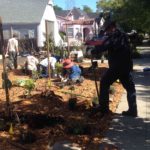 The most recent demonstration food forest installations were done in Vallejo, next is Fairfield. According to their website, sustainablesolano.org, they will be accepting applications starting in August through September for prospective demonstration food forest keepers in Fairfield.
The most recent demonstration food forest installations were done in Vallejo, next is Fairfield. According to their website, sustainablesolano.org, they will be accepting applications starting in August through September for prospective demonstration food forest keepers in Fairfield.
Aug 17, 2017
This August, Sustainable Solano celebrates the expansion of its Sustainable Backyard Program bringing inspirational speakers and free educational workshops and classes to Fairfield. The program will offer Fairfield homeowners passionate about sustainability and community resilience an opportunity to become “food forest keepers” of public demonstration gardens in exchange for a 5-year commitment of public tours and workshops (once or twice per calendar year on a mutually agreed upon schedule). Installations and tours are free and open to the public for a hands-on experience on how to grow food, save water and build community.
The application period begins August 15th and ends September 30th. Installations will take place on three separate weekend dates for each yard in the months of October and November.
Two Fairfield yards will be selected for conversion into edible forest gardens based on permaculture design principles complete with a laundry-to-landscape and rain water catchment system. Rain and secondary water from the laundry will be diverted to mulch-filled ditches, called swales, to slow down and absorb water into the soil using every drop to feed fruit trees, shrubs and plants. Highly visible front-yard lawns are preferred but other types of landscapes (up to 2,000 square feet) are welcome to apply. Households will be evaluated for suitability for a permaculture food forest and a laundry-to-landscape greywater system.
The installation of these demonstration food forests are sponsored by the Solano County Water Agency and are free of cost to selected homeowners. The significant annual water-saving impact of the already established demonstration food forests in Benicia private homes caught the attention of the Solano County Water Agency who supported the expansion of the program to greater Solano County resulting in two additional private demonstration gardens in Vallejo installed in March and April of 2017.
Suisun City and Vacaville residents interested in the program can experience a preview of what is to come to their cities in 2018 by attending these public installations and future workshops after these gardens are established.
Applicants must be available on installation dates and are encouraged to attend the volunteer training workshops offered to the public to learn more about the Sustainable Backyard program, basic permaculture design principles and wise water usage. Fairfield residents may download an application by going to www.sustainablesolano.org or by contacting Sustainable Backyard Program Manager, Nicole Newell at nicole@sustainablsolano.org.
By Nicole Newell, Sustainable Landscaping Program ManagerEvery year, as the first blooms of spring peek through the soil, excitement fills the air in our Solano County community. It’s time for our 9th Annual Food Forest Garden Tour in Benicia & Vallejo — an event...
We are excited that this spring we will be coordinating with the city, the community and Fairfield artist Sheree Rayford to create a community mural along Linear Park Trail. We hope this mural will invite residents to use, enjoy and care for the trail more often. We thank Sheree for sharing her blog on this project and process.
We would like to extend a warm thank you to everyone who attended our 25th Anniversary celebration! Your presence truly made the evening special, and it was wonderful to see so many familiar faces and meet new friends who share our passion for the mission of our organization.
This year marks a significant milestone for Sustainable Solano as we celebrate 25 years of fostering sustainability, resilience, and community well-being in Solano County. To commemorate this achievement, we invite you to join us Sept. 21 for an unforgettable evening in the picturesque Suisun Valley.
The Monarch Milkweed Project and the Vallejo People’s Garden are hosting the inaugural Bay Area Butterfly Festival on May 19!
SuSol’s annual tour of demonstration food forest gardens in Benicia and Vallejo returns on April 27 for its eighth year.
Learn about the Vallejo and Benicia demonstration food forest gardens featured in this year’s tour on April 27!
Tereasa Christopherson-Tso is working with Arts Benicia on an exhibit focused on water conservation. Tereasa reached out to SuSol and visited one of our demonstration food forests, where she beautifully captured the garden. She has given us permission to share her painting and artist statement, which we feel encapsulates why these gardens are so important.
Thanks to everyone who came to our class with Alana Mirror about how she transformed her lawn into an edible and native landscape, all within the budget of the Water-Efficient Rebate Program from the Solano County Water Agency. For resources on how you can make a sustainable transformation in your own backyard (and on a budget!), here’s a playlist of videos from the class and more.
Ainslee Shuemake is a graduate student specializing in water resource management in UC Davis’ Environmental Policy and Management (EPM) Program and wrote this op-ed piece on the state’s proposed water conservation regulations. We wanted to share her insight with you and also let you know that we are currently looking for sites to host laundry-to-landscape educational workshops.
These four templates can help you to design your garden at home.
You may have met Alana at one of SuSol’s events and workshops, or seen some of her music videos or blog posts from those experiences. Here, she shares with us about her journey and talks about transforming her lawn to a sustainable landscape within the budget of the lawn conversion rebate she received.
A reflection on how winter calls for the need for rest and renewal.
Sustainable Solano has had a vision for a while now: To have an office space that serves as a place of education around the many things we teach about, such as sustainable landscaping, water capture and reuse; cooking with seasonal, sustainable local food; and building community resilience.
Alana’s This Wonderful World project has highlighted the Pollinator Pathway garden installation with a series of three songs, as well as songs about the installation of Peace of Eden community garden at City Church Fairfield, a series on laundry-to-landscape greywater, and a series inspired by the Vallejo People’s Garden. This is her reflection and the last song in her spring series — it highlights community gardens through SuSol’s Solano Gardens program.
Interested in learning more about Fairfield or applying? Read the Memo Of Understanding or Download the Application!







 They help homeowners create their own sustainable food forest. The gardens feature edible plants in varying heights and sizes, mimicking a forest. The gardens use a combination of drip irrigation and greywater — laundry water. Swales or depressions, topped with wood chips, were dug to direct water from downspouts to also help water the gardens, which also helps refill the groundwater.
They help homeowners create their own sustainable food forest. The gardens feature edible plants in varying heights and sizes, mimicking a forest. The gardens use a combination of drip irrigation and greywater — laundry water. Swales or depressions, topped with wood chips, were dug to direct water from downspouts to also help water the gardens, which also helps refill the groundwater. The most recent demonstration food forest installations were done in Vallejo, next is Fairfield. According to their website, sustainablesolano.org, they will be accepting applications starting in August through September for prospective demonstration food forest keepers in Fairfield.
The most recent demonstration food forest installations were done in Vallejo, next is Fairfield. According to their website, sustainablesolano.org, they will be accepting applications starting in August through September for prospective demonstration food forest keepers in Fairfield.